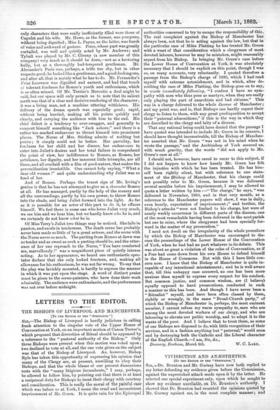LETTERS TO THE EDITOR.
THE BISHOPS OF LIVERPOOL AND MANCHESTER.
[To THE EDITOR OP TER " SPECTATOR.")
Sin,—The Bishop of Liverpool is hardly judicious in calling fresh attention to the singular vote of the Upper House of Convocation at York, on an important motion of Canon Trevor's, which proposed that diversities of Ritual should be appeased by a reference to the " pastoral authority of the Bishop." Only three Bishops were present when this motion was voted upon ; two declined to vote at all, and the one vote given on the subject was that of the Bishop of Liverpool. As, however, Bishop Ryle has taken this opportunity of expressing his opinion that many of the Clergy are, at present, unwilling to 'obey their Bishops, and that the whole blame of our present dissensions rests with the "many litigious incumbents," I may, perhaps, be allowed to follow him, by pointing out that there is at least a reciprocal duty for Bishops to treat their clergy with courtesy and consideration. This is really the moral of the painful ease which was before us at York, I mean the cruel and inconsistent imprisonment of Mr. Green. It is quite vain for the Episcopal authorities concerned to try to escape the responsibility of this. The real complaint against the Bishop of Manchester has always been, not that he is acting against the law, but that in the particular case of Miles Platting he has treated Mr. Green with a want of that consideration which a clergyman of most devoted labours, however he may be mistaken, might reasonably expect from his Bishop. In bringing Mr. Green's case before the Lower House of Convocation at York, it was absolutely necessary that I should be explicit on this point, though I was so, on many accounts, very reluctantly. I quoted therefore a passage from the Bishop's charge of 1880, which I had react myself with extreme astonishment, and in which, after de- scribing the case of Miles Platting, the Bishop goes on to say, in words immediately following, "I confess I have no sym- pathy with men who thus pose as martyrs, when they are really only playing the part of anarchists and bad citizens." This was in a charge delivered to the whole diocese of Manchester; and my point was, and is, that Bishops can hardly expect their clergy to listen to them, with any great predisposition to accept. their "paternal admonitions," if this is the way in which they are described to the clergy and laity of a diocese.
That any rational being could. have denied that the passage I have quoted was intended to include Mr. Green in its censure, I should have thought inconceivable, till the Bishop of Mancites- ter asserted that Mr. Green " was not in his mind when he wrote the passage," and the Archbishop of York assured us,. with much gravity, that the words " did .not apply to Mr. Green's case at all."
I should not, however, have cared to recur to this subject, it I did not happen to know how keenly Mr. Green has felt, the injustice with which he has been treated. He has him- self been rightly silent, but with reference to one state- ment of the !Bishop of Manchester, that his charge could. not possibly refer to Mr. Green, because it was delivered several months before his imprisonment, I may be allowed to quote a letter written by him :—" The charge," he says, " was delivered in November, 1880, and in that very month, as a reference to the Manchester papers will show, I was in daily,. even hourly, expectation of imprisonment ;" and further, the Bishop's attacks "were not limited to his charge, but were of nearly weekly occurrence in different parts of the diocese, one- of the most remarkable having been delivered in the next parish but one to mine, where the clergyman had been specially for- ward in the matter of my prosecution."
I need not dwell on the irregularity of the whole procedure- by which the Bishop of Manchester was encouraged to dis- cuss the proceedings of the Lower House of the Convocation, of York, when he had had no part whatever in its debate. This was about as great a violation of the rules of Convocation, as if a, Peer had come down from his own House to defend himself in the House of Commons. Bat with this I have little con- cern now. I know that the Bishop of Manchester is quite in- capable of any intentional misstatement ; and he is well aware that, till this unhappy case occurred, no one has been more- anxious than myself to express every respect for his conduct. But common justice, and common wisdom, are (I believe) equally opposed to hard prosecutions, conducted in such a manner as this has been. And though I have never been a- " Ritualist" myself, and have been often classed by them,. rightly or wrongly, in the same "Broad-Church party," of which the Bishop of Manchester is, perhaps, the most eminent member, I cannot refuse my warm sympathy to,men who are- among the most devoted workers of our clergy, and who are labouring to elevate our public worship, and to adapt it to the wants of the poor. And I believe that to treat them, as some of our Bishops are disposed to do, with little recognition of their services, and in a fashion anything but " paternal," would 8001, end by destroying both the Catholic and the Liberal character of the English Church.—I am, Sir, &c., Deanery, Durham, March 8th. W. C. LUCE.


































 Previous page
Previous page